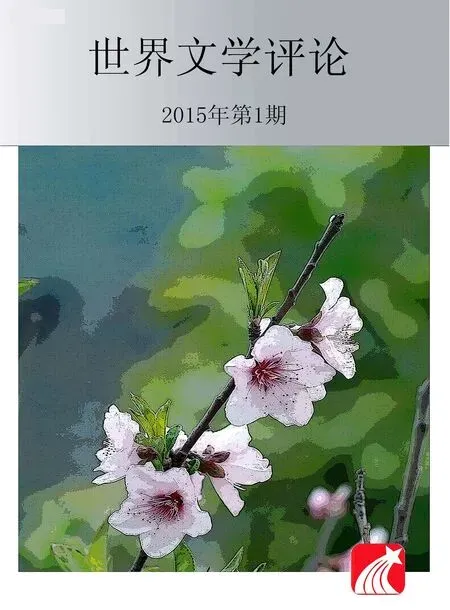(对传统戏剧的批判话语分析:以青春版《牡丹亭》为例)
洪春珠
(对传统戏剧的批判话语分析:以青春版《牡丹亭》为例)
洪春珠
内容提要:笔者以白先勇的青春版《牡丹亭》剧本为例,对其第一幕与原著第一幕进行批判话语分析。通过批判性话语分析,本文讨论了社会和文化差异在构建歌剧话语过程中导致语言差异。
批判话语分析 《牡丹亭》 戏剧文学
Ⅰ. Introduction
With the rising of craze for traditional Chinese culture, more and more people begin to make great efforts in unearthing and promoting traditional Chinese Kun opera. Based on Fairclough's theory about society and culture and Wodak's discourse historical analysis,we know that the interpretation and promotion of traditional opera cannot do with out certain social and historical conditions.
Ⅱ.CDA and the Adaptation of Traditional Opera
With the advent of globalization, "boundaries between social sciences are weakening, and a greater diversity of theory and practice is developing within disciplines". Since the late 19century, the old China was forced to open for western powers, the entire social structure and value system have been tempestuously fluctuated. Western culture and ideology rushed into China and forced China to advance towards modernity. As a result, China hasbeen modernized in all aspects such as language,lifestyle, ways of viewing the world. "Modern Chinese discourses, whether of social or scientific practices or on China's intellectual heritage, are largely articulated in westernized discourses that have been normalized as China's own."However today,influenced by western culture and modernity, almost all kinds of traditional operas, including Kun opera,are on increasingly decline. Poor popularization of traditional opera, insufficient study of opera and the inevitable impingement of modernity make opera literature marginalized.This practical reality questions the future development of opera literature and art recreation.
Ⅲ.A brief Analysis of the Original and Youth Edition of The Peony Pavilion
The first extraction is from Tang's The Peony Pavilion:
【蝶恋花】(末上)忙处抛人闲处住。百计思量,没个为欢处。白日消磨肠断句,世间只有情难诉。玉茗堂前朝后暮,红烛迎人,俊得江山助。但是相思莫相负,牡丹亭上三生路。
【汉宫春】杜宝黄堂,生丽娘小姐,爱踏春阳。感梦书生折柳,竟为情伤。写真留记,葬梅花道院凄凉。三年上,有梦梅柳子,于此赴高唐。果尔回生定配。赴临安取试,寇起淮阳。正把杜公围困,小姐惊惶。教柳郎行探,反遭疑激恼平章。风流况,施行正苦,报中状元郎。
杜丽娘梦写丹青记。 陈教授说下梨花枪。柳秀才偷载回生女。 杜平章刁打状元郎。
The second piece is extracted from Bai Xianyong's youth edition of The Peony Pavilion:
(末扮汤显祖上)
【蝶恋花】忙处抛人闲处住。百计思量,没个为欢处。白日消磨肠断句,世间只有情难诉。玉茗堂前朝后暮,红烛迎人,俊得江山助。但是相思莫相负,牡丹亭上三生路。
(末念)
情不知所起,一往而深。生者可以死,死可以生,梦中之情,何必非真。(下)
Based on a detailed comparison of the above two discourses, several features can be concluded as below.
(1) Deletion of the Plot Reminder
In the libretto "Die Lian Hua"(蝶恋花),it tells the only reason why Tang Xianzu wrote this play is love. And the second libretto "Han Gong Chun"(汉宫春) is a summary of the main story. While in the youth edition, it only retains the "Die Lian Hua", and adds two lines from Tang's another poem. The deletion of the plot outline is out of the concern of adaptability for modern stage. Modern operas focus on the rigid logic and coherence of the play and characters. Sometimes for the purpose of setting suspense, it can never tells the story outline in the beginning. In this regards, it goes totally opposite with traditional opera in which plots hardly can outweigh the elegance of libretto and performance of actors.
(2) Deletion of Some Libretto that Contains Literary Quotation and Obscurity
Tang Xianzu, as a man of letters, he used plenty of historical and literary quotations in the original to add its readability and beauty of arts. For instance, the expression "Fu Gao Tang"(赴高唐) in the first extraction, implies the sexual situation. It is about the love legend of King Xiang of Chu (楚襄王)and Wushan Goddess trysting at Gao Tang. In view of that modern education emphasize international studies, weakening the study of traditional culture and literature, and for easy understanding such historical quotations are deemed unsuitable in modern stage, myriads of obscure expressions are deleted. Likewise, erotic descriptions in the original are no longer visible on modern stage. It is inevitable that over open descriptions will make it an obstacle for traditional opera to popularize.
(3) Modulation of Some Poem
In the youth edition, the last two lines of the first scene is “情不知所起,一往而深。生者可以死, 死可以生,梦中之情, 何必非真。”These two lines are taken from Tang's foreword of the whole play. This stanza has been widely spread on the Internet. At the same time, this stanza founds the romantic tone of the play and attracts the audience's attention and resonance. It can be inferred that the audience and stage effect are two crucial elements in adapting traditional opera.
Ⅳ. Conclusion
This article starts from Fairclough and Wodak's theories about discourse, pointing out the social reasons that underlying the change of discourse. In digging the social reasons, this article also states that,in the youth edition, the stage effects is emphasized,while the opera literariness and adapter's subjectivity are marginalized. As a deletion edition of the original, though received great success, it worth thinking about how it combines modernity and classical aesthetics.
【Works Cited】
[1] Wodak, Ruth. "The Discourse Historical Approach". Methods of Critical Discourse Analysis. Ed. Ruth Wodak and Michael Meyer.London: Sage, 2001, pp.63-95.
[2] Fairclough, Norman. Discourse and Social Change. Cambridge: Polity Press, 1992, p.31.
[3] Wu, Zonejie. Interpretation, autonomy, and transformation: Chinese pedagogic discourse in a cross-cultural perspective. Journal of Curriculum Studies, 2011,5(43), pp.569-590.
[4] Zeng, Chuangchuang. Research on the Original and Youth Edition of The Peony Pavilion. Diss. Chang Sha: Hunan University, 2009.
[5] 汤显祖:《牡丹亭》,人民文学出版社 1963年版,第1页。
[6] 白先勇: 《四百年青春之梦——姹紫嫣红〈牡丹亭〉》,广西师范大学出版社2004年版,第1页。
Critical Discourse Analysis of Traditional Opera—An Empirical Study on the Adaptation Version of The Peony Pavilion
This thesis takes Bai Xianyong's adaptation of The Peony Pavilionas an example, and then make a comparison of the first scene of the adapted version and the original one. By a critical discourse analysis, this article discuss the social and cultural differences which leads to linguistic differences in constructing opera discourses.
Critical Discourse Analysis The Peony Pavilion Opera Literariness
Hong Chunzhu is from School of International Studies, Zhejiang University, studying Chinese and Western Cultures, English and American Literature.
洪春珠,浙江大学外国语言文化与国际交流学院,研究方向为中西文化、英美文学。

